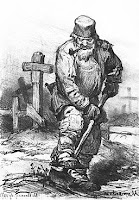 It's almost that time again. Next Sunday, you'll awake to that time when man, in his infinite wisdom, exercises the power to stroke his ego by imposing Daylight Savings Time on a helpless populace, thus supporting his ILLUSION that humans, as the superior of the species, can even control time by manufacturing more hours in the day. I don't know what genius came up with the idea of manipulating time. One of the big Eastern Syndicates, I suspect. Because what, exactly, does Daylight Savings Time do? Other than upset most folks' internal circadian clock, I mean?
It's almost that time again. Next Sunday, you'll awake to that time when man, in his infinite wisdom, exercises the power to stroke his ego by imposing Daylight Savings Time on a helpless populace, thus supporting his ILLUSION that humans, as the superior of the species, can even control time by manufacturing more hours in the day. I don't know what genius came up with the idea of manipulating time. One of the big Eastern Syndicates, I suspect. Because what, exactly, does Daylight Savings Time do? Other than upset most folks' internal circadian clock, I mean?Think about it. Does setting your clock ahead one hour REALLY give you more hours in a day? No, it does not. In the early weeks of the change, it makes you get up in pitch black and it adds a little bit of pre-sunset time to the end of the day. By the middle of summer, you're getting up in the light again, unless you're someone whose job requires you to get up at 5:00 a.m., and if you like to go to bed early -- like that someone I just mentioned who has to get up at 5:00 a.m. -- then you're going to bed in the light. 'Cause it won't actually get dark till close to 9:30 p.m. down here in the Deep South. Think about it for a minute. Here's this poor mother with three small kids. Let's say, seven, five, and three years in age. Since they're not teenagers, they've probably been up since at least 7:00 or 8:00 a.m. And even if the three year old still takes a nap, you can bet your booty the seven and five year old don't, or if they do, it's under so much protest it's hardly worth the effort. So this poor mother, who has absolutely NO time that she can call her own till the kids are asleep, can't even THINK about suggesting bedtime till close to 10:00 p.m. because what kid alive is going to go to sleep in the daylight? It's got to have been dark at least thirty minutes before a young child is going to unwind enough to actually go to sleep. There's that Circadian Rhythm thing again. You know, the built-in internal clock in most lifeforms that respond to LIGHT and DARK? That thing that Daylight Savings Time so arrogantly attempts to manipulate to his whim? (Needless to say, I'd never survive in Alaska.)
I get particularly upset at this time change because when I was a child, back in the Dark Ages, THIS was the original time. The time we're in right now. We didn't "Fall Back" because we didn't have to "Spring Forward". They left time alone. The sun rose around 6:00 a.m. and it got dark around 8:30 p.m. Nobody expected it not to. Nobody wanted it not to. Ah, life was simpler then. Then some genius had to come up with this revolutionary idea to increase "energy efficiency". I especially remember this line being chanted back in the winter of 1974-1975 when the first oil crisis hit. The country stayed on Daylight Savings Time for the entire winter. Because it "saved power". I was in college that year, and I had an eight o'clock class. I didn't live at college, I commuted, which meant I was up at 6:00 and on the road by 6:45. I went to class in the dark, and it was only just beginning to get light when I walked out of my 8:00 o'clock class at 9:00 o'clock. The floodlights were still on, all over campus. So PLEASE explain to me how that saved any energy? It's quite simple. If it's dark in the morning, folks turn on the lights. If it's dark in the evening, folks turn on the light. And really. Be honest. Is there a house or an office building so flooded with natural light that nobody turns on the lights during the day? No, there is not.
So America, I implore you. Stand up as one and send forth your message when you are told it's time to spring forward! Tell them your spring has sprung! As for me, I'll be manipulating things that I CAN manipulate. Like the worlds I create in my books. Where the characters do as I tell them -- Oh, dear Lord! Now I've gone over the deep end myself. My characters NEVER do what I tell them!





















